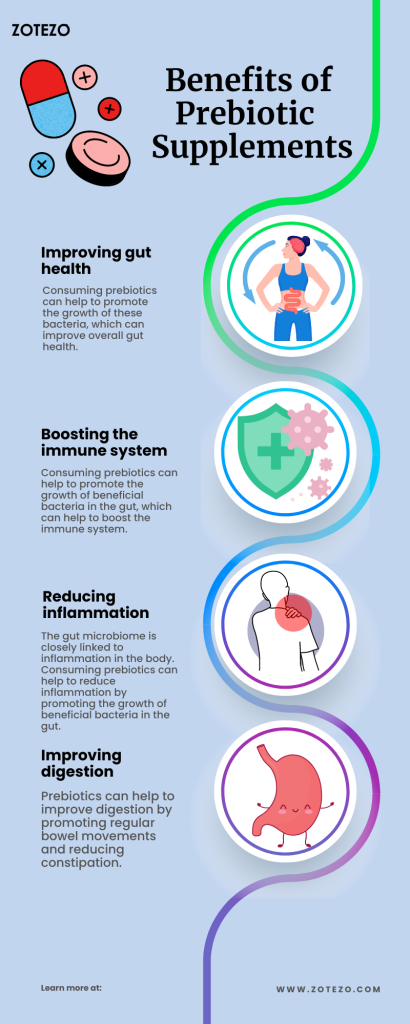Introduction
Are you looking to get healthier by improving your gut health? If so, consider adding prebiotic supplements to your diet. Prebiotics are non-digestible fibers that act as food for beneficial bacteria in the gut – known as probiotics. By consuming prebiotics, you can help maintain a balanced microbiome and ensure proper digestive functions are happening within your body.
But, with so many options flooding the market, it can take time to choose the best one that fulfills your ideal requirements. You may be in confusion wondering about below questions:
1. Which prebiotic supplement is good?
2. What are its benefits or side effects?
3. What to look for while buying a prebiotic supplement?
Don’t worry; we’re here to help. We will closely examine some of the best prebiotic supplements available today, including their key features, benefits, and potential side effects. So read on to learn more about how prebiotic supplements could benefit your overall health and well-being!

Find The Best around the world
Australia
Canada
France
Germany
India
Italy
Japan
Netherlands
Singapore
Spain
Sweden
UAE
UK
USA
Tips for choosing the right Prebiotics for you
When choosing a prebiotic supplement, it is essential to consider the following factors:
Type of prebiotic fiber
Different types of prebiotic fibers have other effects on the gut microbiome. Some common types include inulin, oligofructose, and resistant starch. Look for a supplement that contains a variety of prebiotic fibers for the most benefits.
Purity and potency
Make sure the supplement has been third-party tested for purity and potency to ensure that it meets the standards of quality.
Dosage
Follow the recommended dosage as per the product label or as a healthcare professional advises.
Brand reputation
Choose a reputable brand with a good track record of producing high-quality supplements.
Consult with a healthcare professional
It is always a good idea to consult with a healthcare professional before starting any supplement regimen, especially if you have any underlying health conditions or are taking any medications.
It’s worth noting that prebiotic supplements alone may not be enough to improve gut health. A balanced diet, regular exercise, and stress management should also be considered to enhance gut health.
Benefits of using Prebiotics
Prebiotic supplements may have several potential health benefits, including:
Improving gut health
Prebiotics are non-digestible fibers that serve food for the gut’s beneficial bacteria. Prebiotics can help promote these bacteria’s growth, improving overall gut health.
Boosting the immune system
The gut microbiome plays a crucial role in the functioning of the immune system. Prebiotics can help promote the growth of beneficial bacteria in the gut, which can help boost the immune system.
Reducing inflammation
The gut microbiome is closely linked to inflammation in the body. Consuming prebiotics can help to reduce inflammation by promoting the growth of beneficial bacteria in the gut.
Improving digestion
Prebiotics can help to improve digestion by promoting regular bowel movements and reducing constipation.
Promoting weight loss
Some studies have suggested that prebiotics can help promote weight loss by reducing appetite and increasing feelings of fullness.
It’s worth noting that more research is needed to confirm the benefits of prebiotics, and it’s always a good idea to consult with a healthcare professional before starting any supplement regimen.
Types of Prebiotic Supplements
Several prebiotic supplements are available, each containing different types of prebiotic fibers. Some common types include:
Inulin
A type of soluble fiber found in many fruits, vegetables, and herbs. It is a type of fructan, a complex carbohydrate not digested by the body but fermented by the gut microbiome.
Oligofructose
A type of soluble fiber found in many fruits, vegetables, and grains. It is a type of fructan, a complex carbohydrate not digested by the body but fermented by the gut microbiome.
Resistant Starch
A type of starch that is resistant to digestion. It is found in unripe bananas, cooked and cooled potatoes, and whole grains.
Galactooligosaccharides (GOS)
A type of prebiotic fiber found in human milk and some foods. GOS is made up of chains of galactose and glucose.
Xylooligosaccharides (XOS)
A type of prebiotic fiber found in a wide variety of fruits and vegetables. XOS is sugar alcohol not digested by the body but fermented by the gut microbiome.
Arabinoxylan
A type of prebiotic fiber found in wheat bran, corn bran, and other cereal grains. It is a type of hemicellulose, a complex carbohydrate not digested by the body but fermented by the gut microbiome.
It’s worth noting that different prebiotic fibers may affect the gut microbiome and provide various health benefits. Consulting with a healthcare professional before starting any supplement regimen is advisable.
Side-effects of using Prebiotic Supplements
Prebiotic supplements are generally considered safe and well-tolerated. Still, they may cause some side effects, mainly when consumed in large amounts or by individuals not used to consuming high amounts of fiber. Some potential side effects of prebiotic supplements include:
Gas and bloating
Consuming large amounts of prebiotics can lead to increased gas production and bloating in the gut.
Diarrhea
Some prebiotics can cause diarrhea, especially when consumed in high amounts.
Stomach discomfort
When consuming prebiotics, some people may experience stomach discomfort, such as cramping or abdominal pain.
Allergic reactions
In rare cases, prebiotic supplements may cause an allergic reaction in some individuals, such as hives, itching, or difficulty breathing.
Interactions with Medications
Prebiotics may interact with certain medications, so it’s essential to consult a healthcare professional before taking any supplement.
It is important to note that these side effects are generally mild and temporary and can be alleviated by reducing the dosage or slowly increasing the amount consumed over time. If any side effect persists or becomes severe, it is essential to stop taking the supplement and seek medical attention.
Who should use Prebiotics
Prebiotic supplements may benefit many individuals, but certain groups may significantly benefit from using them. These include:
Individuals with digestive issues
Prebiotics can help to improve gut health by promoting the growth of beneficial bacteria in the gut. This can help to alleviate symptoms such as constipation, diarrhea, and bloating.
Individuals with a compromised immune system
The gut microbiome plays a crucial role in the functioning of the immune system. Prebiotics can help promote the growth of beneficial bacteria in the gut, which can help boost the immune system.
Individuals with autoimmune diseases
The gut microbiome is closely linked to inflammation in the body. Consuming prebiotics can help to reduce inflammation by promoting the growth of beneficial bacteria in the gut.
Individuals looking to lose weight
Some studies have suggested that prebiotics can help promote weight loss by reducing appetite and increasing feelings of fullness.
Individuals looking to improve overall gut health
Consuming prebiotics can help to improve overall gut health by promoting the growth of beneficial bacteria in the gut.
It’s worth noting that prebiotic supplements alone may not be enough to improve gut health. A balanced diet, regular exercise, and stress management should also be considered to enhance gut health. It is always a good idea to consult with a healthcare professional before starting any supplement regimen, especially if you have any underlying health conditions or are taking any medications.
Recommended Dosage of Prebiotic Supplements
The recommended dosage of prebiotic supplements can vary depending on the specific supplement and the individual. A generally recommended starting dose is 3-5 grams per day and can be increased gradually. For some prebiotics, such as inulin, the recommended dose can be as high as 20-30 grams daily. It’s essential to follow the recommended dosage on the product label or as a healthcare professional advice. It’s also important to start with a low dose and increase gradually to allow the gut to adjust to the increase in fiber and to minimize the risk of side effects such as gas, bloating, and diarrhea.
It’s also worth noting that prebiotics supplements alone may not be enough to improve gut health. A balanced diet, regular exercise, and stress management should also be considered to enhance gut health. Consult with a healthcare professional before starting any supplement regimen, and always follow the recommended dosage on the product label or as advised by a healthcare professional.
Do you represent a health, nutrition, beauty, or fitness brand?
Share your brand story, and its philosophy with our millions of readers looking for the highest quality products for their well-being. We understand that your products cater to the unique needs of an individual; here’s your opportunity to share the purpose and unique value proposition of your products that you’ve so caringly created for their well-being.
Share your brand story
Frequently asked questions on Prebiotics
1. What are prebiotic supplements?
2. How do prebiotic supplements work?
3. What are the benefits of taking prebiotic supplements?
4. Who should take prebiotic supplements?
5. Are prebiotic supplements safe?
6. How many prebiotic supplements should I take?
Are you a health, nutrition, beauty or fitness expert?
Inviting all health, fitness, beauty, and wellness experts from around the world to join Zotezo, the ultimate trust commerce platform, and empower millions to make the right decisions for their wellbeing. Share your knowledge, review the highest quality products, and provide valuable insights to our engaged audience. Together, let's create a healthier, happier world!
Join our expert advisory board
Conclusion
Though there are many benefits of prebiotics, there are only a few we’ve listed in this post. As you can see, prebiotics have many positive effects on the gut and overall health. Supplementing with a quality prebiotic is a great way to improve your gut health. Consider what specific health goals you hope to achieve by taking a prebiotic supplement. Once you know what you’re looking for, finding the right product will be much easier. There are many great prebiotic supplements out there – which one will you try?





